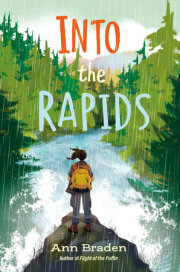LIBBY MONDAY, APRIL 30 This is going to be the best sunrise ever. I slather on more orange paint, catching the drips with my paintbrush and mixing them into the hot pink. I swirl it around and around. My paintbrush is like the band teacher conducting. I don’t play an instrument, but I’ve seen him waving his arms when I peek in the band room.
I dip my brush back into the can and make even bigger circles, then add extra dollops above, like sparks flying up. I love how the sparks look. I know that’s not how people usually make sunrises, but there’s fire involved, right? I add more on the other side. I have to. There’s too much joy inside me to not.
I step back. I knew this would make me feel better!
Now it’s time to add the yellow. I kneel down and pry the lid off the can. A blazing inferno just waiting to be unleashed.
That’s when I hear footsteps.
And Principal Hecton’s voice.
“Libby Delmar, what have you done to that wall?”
I sit in the seat in front of Principal Hecton’s desk. He collapses into his chair and lets out a sigh.
His desk would look better with polka dots. He could get the magnetic kind, and then those of us having to stare at it could rearrange them to keep it fresh. Orange, blue, and purple dots would be nice.
Principal Hecton leans back and closes his eyes. “I should have known.”
Maybe with a few yellow dots. That’d really pop.
He opens his eyes and leans over the desk. “Are you going to be just like your brother? And your dad?”
No way! Is he kidding? I try to do the exact opposite of them.
“Because I don’t think I can handle that,” he says.
Okay, maybe I did do some bad stuff . . . but it was to make things better. And it already did. I eye the still-wet paint splotches on my green pants. Value added!
“And don’t think I didn’t hear the stories about your grandpa, too, back when I was in school.” Principal Hecton shakes his head. “I’ve got to tell you, I’m tired of your family pushing people around.”
I press my lips together and try to imagine that sunrise. I’m not like them.
Principal Hecton eyes me. “And weren’t you just in my office a week ago?”
It was twelve days.
“For physically assaulting Danielle Fisher.”
That was a mistake. I shouldn’t have let her get to me. I wasn’t wearing that awesome rainbow outfit for other people. I was wearing it for myself. Who cares if she said I looked like a freaky clown.
Well, my fist cared.
“As you know, we have rules around here for a reason . . .”
He keeps talking, and I have to bite my lip hard so I don’t talk back. Yes, I know punching her in the face was the wrong thing to do. Yes, I know that “not thinking was the problem,” but did Danielle think before
she talked? Because if she did, that’s even worse.
And I get that girls aren’t supposed to give other people bloody noses. Instead, everyone should be like model student Danielle, who fights the “right” way: by convincing the entire softball team to stop talking to me. So that even Adrianna Randell now walks past me without a word, as if we haven’t spent nights sprawled on pillows and giggling on her bedroom floor.
That sunrise was going to help me ignore it all.
Principal Hecton is squeezing his hands together and almost whispering. “I’m going to have to do it,” he mutters.
Is he talking to himself?
“Okay,” he says louder, and lets out a long sigh. “I am going to call your father. And tell him he needs to come to school. He needs to see for himself what you’ve done.”
My dad. Really? I’ve never seen him in my school. He’s not the kind to come to open house or parent conferences. It doesn’t matter how many times teachers call home to schedule a conversation about my missing work or my “inattentiveness in class.” He doesn’t exactly appreciate getting “advice” about his children.
“I’m not like my family,” I blurt out.
Principal Hecton laughs nervously. “I wish that were true.” He starts writing up an in-school suspension slip. “Right now, I want you to bring those cans of paint back to the art closet and clean up that closet while you’re there. Then tomorrow, during your in-school suspension, you’ll be repainting that wall white again, like it’s supposed to be.”
Mrs. Ecker, the long-term art sub, is waiting for me when I get to the art room. She leads me toward the art supply closet as if I don’t know where it is. As if I wasn’t just in there an hour ago, when the door was left open like an invitation and the paint cans were screaming to me. I used to get to go in the closet all the time when Mrs. DeSouza was still here and we had an actual art teacher.
I carry the paint cans into the closet and breathe in. It smells glorious. Of course, not as good as when Mrs. DeSouza would bring lunch from her brother’s Jamaican food truck and the room would smell like jerk chicken and paint. Those lunch periods were heaven, and I thought I had it made.
“Chop-chop,” Mrs. Ecker says. “There’s plenty to do.” She pokes at a pile of paint tubes missing their caps and recoils like a rainbow slug just slimed her.
I set down the cans of paint and look around. So many art supplies. Just sitting here!
“When I was in school, we would respect the property of our superiors,” Mrs. Ecker says. “What would your parents think? You should listen to them.”
If I listened to what my dad said, I would have punched Danielle Fisher long ago. I run my fingers along the bottles of acrylic paints. And then I remember I’m supposed to be cleaning, so I nudge them until they’re in a bit of a line. Paints shouldn’t sit unused like this. It makes me twitchy.
I move on to a different shelf. There are a whole lot of sheets of little ceramic tiles that Mrs. DeSouza ordered for a mosaic before she moved away from Spring Falls. Some have slipped out of place, and I start to restack them, but there’s something else jammed in the way. I move a few of them to the side and see the smooth rock Mrs. DeSouza used to keep on her desk. She left so suddenly that she must have forgotten it. I turn it over in my hand. Carved in a circle along the edge are the words
Create the world of your dreams. Here is someone who got me.
But is that even possible? Because the world of my dreams would have a sunrise opposite the girls’ locker room that
doesn’t have to get painted over.
I glance at Mrs. Ecker. She’s studying the fire escape map on the wall. As quick as I can, I shove the rock into the pocket of my hoodie.
Because what if what the rock says is possible? I mean, Mrs. DeSouza was someone who knew what she was talking about. Like, she knew how to draw a bird with only four lines.
Before Mrs. Ecker looks back at me, I swipe a bottle of glitter glue too. Because glitter.
That’s when the secretary’s voice comes on the art-room intercom. “Mrs. Ecker? Libby Delmar’s father is here. Please send her to the office.”
I can’t believe my dad is here. I walk as slowly as possible down the hall, wondering how mad he’ll be. And it’s not exactly predictable who he’ll be mad at. The only constant in life is that it’s never at my older brother, Rex. He might have gotten suspended all the time when he was in school, but as long as Rex won the fight, my dad didn’t care.
I feel the glitter glue in my hoodie pocket and stop. I’m pretty sure the world of my dreams would be all kinds of sparkly. I glance in both directions down the hallway. Empty.
I take out the glitter glue and squeeze a dollop of it onto one of the drab hallway tiles. I kneel down and spread it all around, hoping it’ll look like the ocean waves reflecting that sunrise.
Except that when I stand up, it only looks like a smear. A sad gray smear.
Who am I kidding? My world is too much of a mess to just add sparkle.
The sound of footsteps coming gets me walking again, and I practice my excuse in my head:
I’m just on my way to the office. But it’s not a teacher who comes around the corner— it’s a boy from my English class.
“Mr. Cruck told me to find you to give you this stuff,” he says. “We’re starting five-paragraph essays, and we’re supposed to color-code our notes, and he wants you to . . .”
He keeps talking, but all I can see are the index cards and the box of colored pencils that he’s handing me like a gift. Wasting these on a five-paragraph essay? No chance.
A five-paragraph essay is not the world of my dreams.
When I get to the office, my dad is yelling at Principal Hecton. “I’m in the middle of running a business! You think I have time to come here and help you do your job, Paulie?”
Paulie? Who’s Paulie? And then I realize: Principal Paul Hecton. I suddenly have a vague recollection that my dad and theprincipal were in school together.
Principal Hecton certainly looks like he remembers— and I bet he’s having a whole lot of regret right now.
“I’d like you to see the vandalism before it gets painted over,” he says.
“Then take a picture of it,” my dad says. “You heard of a camera?”
Maybe my dad isn’t angry with me, but this isn’t much better. I take a step back and try to merge with the leafy potted plant at the entrance to the main office. Through the glass wall, I see none other than Danielle Fisher walking by. Great. Now the whole seventh grade will hear about this.
“You just want to make yourself feel important with all your calling home and handing out suspension slips,” my dad continues. “But if you think you can use my daughter in your power games, you’ve got another thing coming.”
Principal Hecton’s face reddens. He picks up a student handbook. “With all due respect, I’d like to refer you to page thirty-four, where it discusses the vandalizing of school property. There is nothing personal about—”
“Libby, get your stuff,” my dad says, turning to me. “We’re leaving.”
I look between my dad and Principal Hecton. “Right now?”
“I’m not spending another minute being talked down to by someone who didn’t even know how to tie his shoes until fourth grade.”
I keep my backpack perched on my lap for the drive home. We live just on the other side of downtown, and my dad doesn’t exactly drive slowly, but still, it’s a long eight minutes.
The radio guy is yammering on about the varsity boys’ baseball game last night. My dad turns it way up, as a not so subtle jab at me. He hates it that I’m off the softball team, but who in their right mind would stay on a team that doesn’t want them?
We pull into the driveway, and I’m about to get out when my dad relocks the doors.
“You’re grounded,” he says. “For a month.”
A month? Is he serious?
Then he unlocks the car and climbs out. “And don’t embarrass me again.”
By the time I’ve steadied my breath, my dad is already at the bottom of our driveway talking with our neighbor Hal—probably convincing him to let him tune up his lawn mower.
Our apartment is in one of those big sprawling houses built when the mills in town were chugging away. And even though the house has four apartments, somehow my dad got our landlord to give him full use of the garage for his engine business. Plus, with him strutting up and down the driveway all the time, the other renters decided to not even try to use the two parking spots in front of it. They just park on the street.
Last year, in sixth grade, we learned how there are tons of crowded old mill towns like ours on riverbanks up and down the East Coast. Maybe they’re all sports-obsessed, and maybe every single one has a guy like my dad, who, no matter what happens, makes everything about him.
I push open the passenger door. In a crack of the driveway, a dandelion is poking through, and I focus on it, keeping my head down.
I go straight inside to the kitchen. At least there’s a new box of that healthy cereal in the cupboard—my mom actually listened when I told her what I’d learned about the importance of whole grains. I reach in the fridge to get some milk, and there’s a whole chicken defrosting in there. My mom’s currently on a seventy-six-ways-to-make-chicken kick.
Part of me wants to call her. But only a small part, because she hasn’t forgiven me for quitting the softball team either. And my mom doesn’t exactly let things go. You should see the way she stands at the checkout counter in the 7-Eleven and stares down the kids who try to shoplift. She doesn’t let up until they’ve dropped whatever they were holding and run away. And she’s been looking at me like that for the past twelve days.
When I get to my bedroom, I throw my backpack onto the floor. Smack in the middle of the floor, too, because this whole room should be mine. But even though my brother, Rex, works at L&H Wholesalers and has an apartment of his own, he still uses this room as his closet. He never got over having to share it. When an unexpected baby sister shows up when you’re eight, she’ll always be unwelcome.
At least he doesn’t sleep here. I remember Rex lying on his bed, zinging baseballs at the ceiling on the days he was suspended. The cracks in the paint are still up there.
I’m not like Rex, am I?
Even if I’m surrounded by his stuff. Even if we come from the same parents. Even if I just got suspended for vandalism.
I squeeze my eyes shut and press my fists to my forehead.
I.
Will.
Not.
Be.
Like.
Them.
I open my eyes and kick my backpack clear across the room. It lands upside down on my bed, spilling out some contents. And suddenly, I remember what’s inside it. I scramble over to my bed and carefully take stock: three index cards, five colored pencils, one bottle of glitter glue, and one rock.
Create the world of your dreams. How exactly am I supposed to create the world of my dreams with just this?
But then I remember what Mrs. DeSouza used to say to me when I’d stare at a blank white sheet of paper.
One line is all it takes. I think of that dandelion pushing its way through the crack in the driveway. That’s me. That is
me. I just have to find my way to the sunshine.
And these are the materials I have.
I sit on the floor and start to draw a dandelion pushing its way up on one of the cards. Behind it, I draw the sun rising over a mountain. And the sky is beautiful. I add orange and red and yellow all mixing together. And then I add glitter glue all over it.
I close my eyes tight and imagine Mrs. DeSouza looking over my shoulder. “Look at that light. Look at that sparkle,” she’d say in her beautiful Jamaican accent. “And think about it, Libby, that’s happening every day in every part of the world. Isn’t that amazing?”
I open my eyes. In the shadow of the mountain, I write the word
amazing.
I stare at it, then I add two more words.
You are amazing Because if I am going to have to sit in this room for a month, this is what I need staring at me.
Copyright © 2021 by Ann Braden. All rights reserved. No part of this excerpt may be reproduced or reprinted without permission in writing from the publisher.







